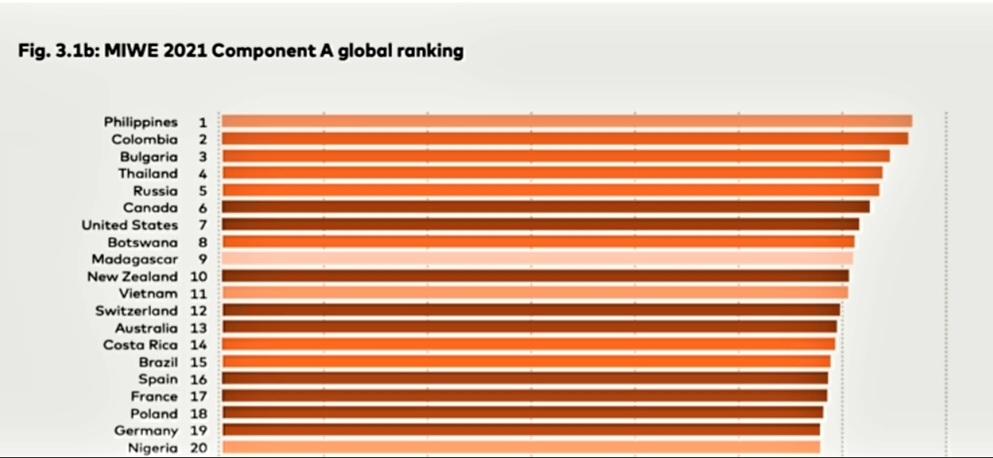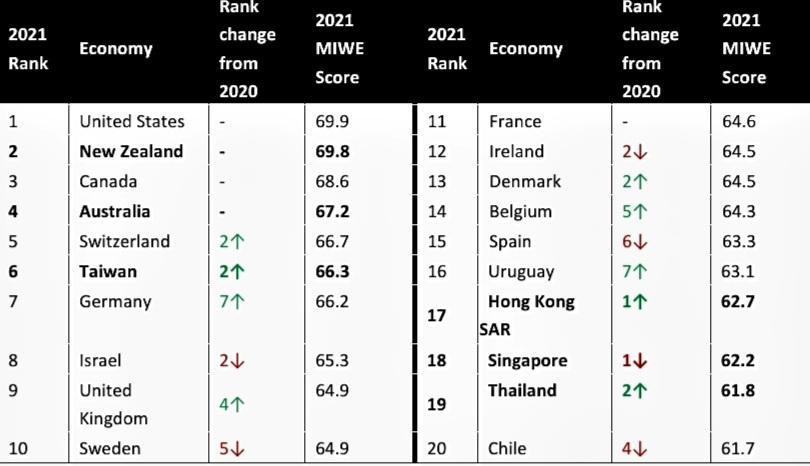
According to a recent Mastercard study, despite the COVID-19 pandemic having a disproportionate impact on women entrepreneurs around the world – particularly in emerging nations – women are displaying the fortitude to succeed against the odds. Despite considerable social-cultural and infrastructure constraints that threaten to stifle their growth, women in the Philippines have done particularly well in entrepreneurship. Women’s entrepreneurship in the Philippines and Asia’s lower-middle-income economies is hampered by a lack of government SME assistance, limited access to entrepreneurial capital, and a severe lack of educational possibilities.
The fifth edition of Mastercard’s Index for Women Entrepreneurs (MIWE), which covered 65 economies and 82.4 percent of the worldwide female labor force, looked at women’s development in the global entrepreneurship scene over the last two years. Despite global efforts to reduce the pandemic’s effects, women have suffered significant economic and societal consequences, according to the research. As a result, the time frame for closing the global gender gap could be stretched by another 36 years.
Women’s entrepreneurship is on the rise in Southeast Asian economies such as the Philippines, Thailand, Indonesia, and Vietnam, according to MIWE’s recent research. Women were identified in these nations participating in significant levels of entrepreneurship, often on par with males, despite the fact that the environment in which they operate remains challenging. Despite women’s lesser engagement in the workforce, the Philippines remains a global leader in women’s advancement outcomes for the third year in a row, and are just as motivated by opportunity as women in very business-friendly environments.
The Ranking: top economies for women’s advancement outcomes (Component A)

The graph above shows the latest overall ranking of the 65 economies in relation to women’s advancement outcomes (Component A) where the Philippines takes the top spot for the third consecutive year.
“Women entrepreneurs in the Philippines are a critical part of the country’s economic recovery. Hence, there is a need to ensure that women entrepreneurs, especially owners of smaller businesses, have access to the knowledge, resources, and tools they need to thrive and scale. Across the world, Mastercard is working with key partners in the public and private sectors to provide 25 million women entrepreneurs with payments technologies and access to initiatives like the company’s Digital Acceleration program, to help them participate in the digital economy and become more resilient,” said Simon Calasanz, Country Manager, Philippines, Mastercard.
Asia Pacific leads the world on all key indicators that determine the success of women’s entrepreneurship
Six economies from the Asia Pacific region have found their place on MIWE 2021’s global leaderboard for being the best places in the world for women entrepreneurs. New Zealand, Australia, and Taiwan have emerged as the regional leaders, propelled by strong scores across all three components that constitute MIWE: women’s advancement outcomes, knowledge assets, and financial access. These economies continue to furnish the conditions required to facilitate women’s access to financial support and services and their ability to start, operate, thrive, and adapt to the market circumstances. In these economies where the entrepreneurial ecosystem is enabling, women were driven by the pursuit of new opportunities emerging from the pandemic, demonstrating a proactive and upbeat entrepreneurial attitude that will be vital in supporting economic recovery and long-term growth.
The Ranking: top economies for women entrepreneurs (Asia Pacific economies are in bold)

In Singapore and Taiwan, access to finance ranked higher than anywhere else in the world, while New Zealand topped global rankings for having the most supportive entrepreneurial conditions. On average, high-income economies in Asia Pacific scored higher in providing a dynamic landscape for women entrepreneurs, unhindered by access to finances and opportunities. However, in certain high-income economies, such as Japan, women continue to be underrepresented economically and have a limited presence in the business scene.
Gender-focused policies and financial inclusion remain key to unlocking women’s entrepreneurial potential
Although MIWE points to the pandemic being particularly taxing on women, fewer than 10% of COVID-19 recovery measures implemented worldwide include gender-sensitive strategies. In economies such as Canada and Argentina, women’s progress has been positively influenced by gender-focused policies implemented to address women’s economic security during the pandemic.
Likewise, in Asia, women entrepreneurs in Thailand, Singapore, and Taiwan have benefited from initiatives aimed at supporting not them directly but small enterprises where they are highly represented. Such correlation proves that government policies that intentionally influence women’s entrepreneurship can meaningfully contribute to a swifter recovery.
Mastercard made a global commitment to link 25 million women entrepreneurs to the digital economy by 2025 as part of its commitment to building a world where women entrepreneurs are equally represented and encouraged. Women’s entrepreneurship will not only work as a stimulus for growth and innovation, but it will also enhance the communities that surround successful women, leading to a more equitable and long-term global recovery. The Mastercard Index of Women Entrepreneurs report for 2021 may be downloaded here.
Methodology
The 2021 Mastercard Index Women Entrepreneurs (MIWE) uses 12 indicators and 27 sub-indicators to create three “Components”: women’s advancement outcomes; knowledge assets and financial access; entrepreneurial supporting conditions. These allow us to track factors and conditions that support and drive the female share of business owners in an economy across 65 economies, representing about 82% of the world’s female labor force.
The updated MIWE ranks and scores each economy according to its performance over the past year. Aggregating these scores, the index provides an overall assessment of how women are faring in the business, financial, education, and workplace settings compared to their male counterparts at the national level as well as their peers on a global level. In this 5th edition, the number of economies analyzed has been expanded from 58 to 65 (with the addition of Qatar, Cyprus, Bulgaria, Morocco, Jordan, Lebanon, and Madagascar).
To accommodate the addition of new indicators and sub-indicators in the analysis and maintain the historical series and allow for comparisons, we have also re-published the index, component, and benchmark scores for the previous two years as well.
About Mastercard (NYSE: MA)
Mastercard is a global technology company in the payments industry. Our mission is to connect and power an inclusive, digital economy that benefits everyone, everywhere by making transactions safe, simple, smart, and accessible. Using secure data and networks, partnerships and passion, our innovations and solutions help individuals, financial institutions, governments, and businesses realize their greatest potential. Our decency quotient, or DQ, drives our culture and everything we do inside and outside of our company. With connections across more than 210 countries and territories, we are building a sustainable world that unlocks priceless possibilities for all.
www.mastercard.com

No Comments